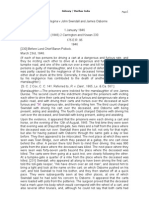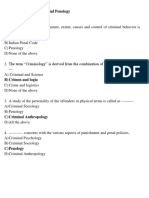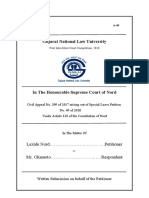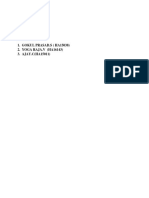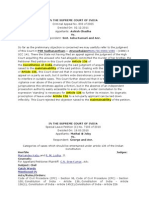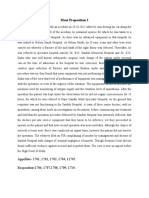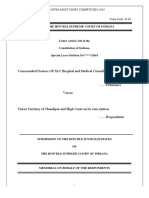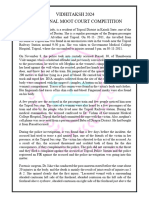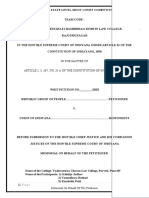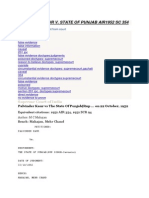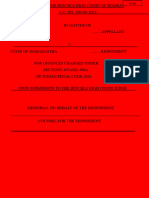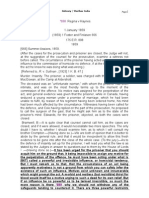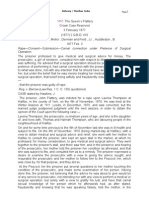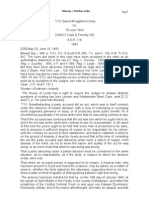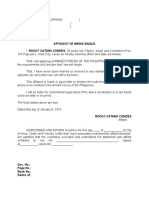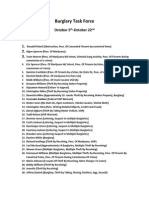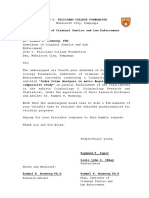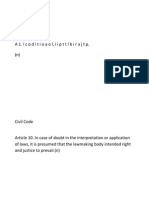The King v. Meade (1909) 1 K.B. 895
The King v. Meade (1909) 1 K.B. 895
Uploaded by
Bond_James_Bond_007Copyright:
Available Formats
The King v. Meade (1909) 1 K.B. 895
The King v. Meade (1909) 1 K.B. 895
Uploaded by
Bond_James_Bond_007Original Description:
Copyright
Available Formats
Share this document
Did you find this document useful?
Is this content inappropriate?
Copyright:
Available Formats
The King v. Meade (1909) 1 K.B. 895
The King v. Meade (1909) 1 K.B. 895
Uploaded by
Bond_James_Bond_007Copyright:
Available Formats
28/07/2013
Delivery | Westlaw India
Page1
*895 The King v Meade Court of Criminal Appeal 23 February 1909 [1909] 1 K.B. 895 Darling , Walton , and Pickford JJ. 1909 Feb. 23 Criminal LawMurderDrunkennessManslaughterPrisoner so affected by Drink as to be incapable of knowing that his Act is dangerousDirection to Jury. Upon the trial of an indictment for murder the question whether the jury are justified in returning a verdict of manslaughter on the ground of the voluntary drunkenness of the prisoner may be determined by the following rule: A man is taken to intend the natural consequences of his acts. This presumption may be rebutted, in the case of a man who is drunk, by shewing his mind to have been so affected by the drink he had taken that he was incapable of knowing that what he was doing was dangerous, i.e., likely to inflict serious injury. If this be proved, the presumption that he intends to do grievous bodily harm is rebutted. Upon the trial of a prisoner for murder evidence was given that he was drunk at the time of the commission of the act charged, and the judge gave the following direction to the jury: In the first place, every one is presumed to know the consequences of his acts. If he be insane, that knowledge is not presumed. Insanity is not pleaded here, but where it is part of the essence of a crime that a motive, a particular motive, shall exist in the mind of the man who does the act, the law declares thisthat if the mind at that *896 time is so obscure by drink, if the reason is dethroned and the man is incapable therefore of forming that intent, it justifies the reduction of the charge from murder to manslaughter. , that the direction was right. APPEAL by the prisoner against his conviction on grounds involving questions of law. The prisoner was tried at the Leeds winter assizes before Lord Coleridge J. and a jury for the murder of Clara Howell. At the trial it was proved that the prisoner brutally ill-treated the deceased woman during a great part of the night on which she died, he said that he would give her a good hiding, and he broke a broomstick over her. He struck her a blow on the top of the nose, and, as she fell towards him, gave her a violent blow with his fist on the lower part of the body, which ruptured an intestine, and she died during the night. Evidence was called on behalf of the prisoner to shew that at the time he caused the death of Clara Howell he was drunk, the defence being that the prisoner did not intend to cause the death of, or grievous bodily harm to, the dead woman, and that the jury in deciding that question ought to take into consideration the fact that he was drunk, and would, on the facts, be justified in returning a verdict of manslaughter. In the course of his summing up to the jury Lord Coleridge J. said: In the first place, every one is presumed to know the consequences of his
28/07/2013
Delivery | Westlaw India
Page2
acts. If he be insane, that knowledge is not presumed. Insanity is not pleaded here, but where it is part of the essence of a crime that a motive, a particular motive, shall exist in the mind of the man who does the act, the law declares thisthat if the mind at that time is so obscure by drink, if the reason is dethroned and the man is incapable therefore of forming that intent, it justifies the reduction of the charge from murder to manslaughter. The jury returned a verdict of guilty of murder. The prisoner appealed from his conviction on the ground that the direction of Lord Coleridge J. to the jury in his summing up would lead them to suppose that they must either find that the prisoner was guilty of murder, or (in order to justify them in bringing in a verdict of manslaughter) that he was incapable of *897 forming the intent to cause the death of, or grievous bodily harm to, the dead woman, because they must find that he was insane or in a state resembling insanity at the time, the proper alternatives to be left to them being, it was contended, murder or absence of intention in fact, and therefore manslaughter. J. Willoughby Jardine , for the prisoner. Lord Coleridge J. in his summing up misdirected the jury. The words used by him would naturally convey to the jury the meaning that in order to acquit the prisoner of murder it was necessary for them to find that he was mad through drunkenness at the time he committed the crime. The question ought to have been left to the jury whether the prisoner in fact had no intention of doing grievous bodily harm, as well as whether he was incapable of forming the intention: Reg. v. Doody . 1 Rex v. Carroll 2 is not in point. It involved the question of the effect of provocation. Rex v. Meakin 3 is in the prisoner's favour. Rex v. Grindley 4 was disapproved of by Park J. in Rex v. Carroll . 5 In Reg. v. Monkhouse 6 , Reg. v. Doherty 7 , and Rex v. Carroll 8 the instrument which was the cause of death was a deadly weapon. Bruce Williamson , for the prosecution. A person is presumed in law to intend the consequences of his act. Unless the jury could draw the inference upon the evidence that the prisoner was incapable of having the intention, the inference of law that he had the intention applies: Reg. v. Doherty . 9 Where drunkenness is relied on as a defence to a charge of murder, the jury cannot come to the conclusion that the prisoner did not intend to cause the death unless they first come to the conclusion that he was so drunk as to be incapable of having the intention: Reg. v. Monkhouse .
10
The judgment of the COURT (Darling, Walton, and Pickford JJ.)was delivered by DARLING J. In this case the question to be decided arises out of certain words used by Lord Coleridge J. in summing up to the *898 jury. Complaint is made as to certain words used by him in leaving to the jury considerations applicable to the case of a man who, being drunk at the time, has done acts which result in the death of another, with whose murder he is charged. I will deal with these words presently; but it is necessary before doing so to deal with the history of the doctrine of the effect of drunkenness upon a charge of a crime, such as murder, where the question of intent is involved. Originally the law was that although an insane person was not liable to the same consequences and ought not to be judged by the same standard as a sane one, yet, if he was suffering from dementia affectata, that is, a temporary insanity caused by the accused's own voluntary act in getting drunk, then drunkenness was no
28/07/2013
Delivery | Westlaw India
Page3
excuse for crime: 1 Hawkins' Pleas of the Crown, c. 1, s. 6, where it is said, And he who is guilty of any crime whatever through his voluntary drunkenness, shall be punished for it as much as if heen had be sober. The law stood as thus expressed for many years, and, as far as we know, the point was first decided in a contrary sense in Rex v. Grindley 11 , decided in the year 1819. Since then there have been many decisions in which judges have attempted to express the doctrine that where intent is of the essence of a crime with which a person is charged, that intent may be disproved by shewing that at the time of the commission of the act charged the prisoner was in a state of drunkenness, in which state he was incapable of forming the intent. Different judges have expressed themselves differently, but not so differently as to be irreconcilable and to prevent the Court from saying that they were expressing the same doctrine. The two authorities which bear most upon the point are Reg. v. Monkhouse 12 and Reg. v. Doherty 13 , the first decided by Coleridge J. and the second by Stephen J., and no doubt identical expressions were not used in each. But it is necessary to repeat what has often been said before in this Court, namely, that when a judge sums up to a jury he must not be taken to be inditing a treatise on the law. He addresses himself to the particular facts of the case then before the jury, and no judge can affect, in those circumstances, to give *899 an exhaustive definition, or one which applies to every conceivable case. It is enough if he gives a sufficient definition, and rightly directs the attention of the jury to the facts of the case before them. That is true of the present case. I have stated what the ancient view was, and that it is not now in accordance with the law. We do not consider it any part of our duty to enlarge the rule of law or to use language wider than that used by the judges who have considered the question before, for it is not our duty to say anything which will confer an immunity greater than that which they already enjoy on persons who have voluntarily made themselves drunk. On behalf of the prisoner it was said that the words used by Lord Coleridge J. would induce the jury to suppose that unless they found the appellant insane they would not be justified in finding him guilty of manslaughter. But he had expressly told the jury that there was no plea of insanity. That was sufficient to warn the jury not to make such a mistake. The appellant brutally ill-treated the deceased woman during a great part of the night on which she died, he said that he would give her a good hiding, and he broke a broomstick over her. He struck her a blow on the top of the nose, and, as she fell towards him, gave her a violent blow with his fist on the lower part of the body, which ruptured an intestine, and she died during the night. If he did do this and she died of the injury, and he intended to inflict serious bodily injury on her, he was guilty of murder. It was contended at the trial that the presumption that the prisoner had this intent was rebutted because he, by reason of drunkenness, had no such intent. It then became the duty of Lord Coleridge J. to lay down the rule as to the nature of the drunkenness which would be sufficient to satisfy them that the prisoner had not that intent. We desire to state the rule in the following terms: A man is taken to intend the natural consequences of his acts. This presumption may be rebutted(1.) in the case of a sober man, in many ways: (2.) it may also be rebutted in the case of a man who is drunk, by shewing his mind to have been so affected by the drink he had taken that he was incapable of knowing that what he was doing was dangerous, i.e., likely to inflict serious injury. If this be *900 proved, the
28/07/2013
Delivery | Westlaw India
Page4
presumption that he intended to do grievous bodily harm is rebutted. In our opinion this doctrine was not expressed by Lord Coleridge J. in such a way as to mislead the jury into thinking that insanity must be proved. We have carefully considered the words used by him. We have been unable to trace some of them to the language used previously by judges. But a judge is not condemned to use no words which are not commonplace. It is said that some of the language used by Lord Coleridge J. is picturesque and figurative. No doubt; but it is quite easy to say in picturesque and figurative language that which is true. We cannot say that the language used by Lord Coleridge J. differs in its meaning from the rule we have just laid down. It is unnecessary to criticize the very words used. Unless we think them misleading and calculated to lead the jury to think that something equivalent to absolute insanity must be proved to entitle them to bring in a verdict of manslaughter, this appeal ought to be dismissed. After having carefully considered the authorities and the language used by Lord Coleridge J., we have come to the conclusion that there is nothing in the words used by him which is contrary to the rule we have laid down or to former decisions, and that the appeal ought therefore to be dismissed. . Appeal dismissed. (J. E. A.) ____________________________________________________________________ 0 1 2 3 4 5 6 7 8 9 10 11 12 1. (1854) 6 Cox , C. C. 463. 2. (1835) 7 C. & P. 145 . 3. (1836) 7 C. & P. 297 . 4. (1819) 1 Russ. on Crimes (6th ed.) 144. 5. (1835) 7 C. & P. 145 . 6. (1849) 4 Cox , C. C. 55. 7. (1887) 16 Cox , C. C. 306. 8. (1835) 7 C. & P. 145 . 9. (1887) 16 Cox , C. C. 306. 10. (1849) 4 Cox , C. C. 55. 11. 1 Russ. on Crimes (6th ed.) 144. 12. 4 Cox , C. C. 55. 13. 16 Cox , C. C. 306.
You might also like
- R. v. Codere (1916) 12 Cr. App. R. 21Document6 pagesR. v. Codere (1916) 12 Cr. App. R. 21Bond_James_Bond_007100% (1)
- Essential Soft Skills for Lawyers: What They Are and How to Develop ThemFrom EverandEssential Soft Skills for Lawyers: What They Are and How to Develop ThemNo ratings yet
- Motion To Enforce Settlement Agreement in CaliforniaDocument3 pagesMotion To Enforce Settlement Agreement in CaliforniaStan Burman75% (4)
- Memorial - Petitioner 2.11Document22 pagesMemorial - Petitioner 2.11SanaNo ratings yet
- R. V. Tatam (1921) 15 Cr. App. R. 132Document2 pagesR. V. Tatam (1921) 15 Cr. App. R. 132Bond_James_Bond_007No ratings yet
- R. v. Swindall and Osborne (1846) 2 C and K 230Document3 pagesR. v. Swindall and Osborne (1846) 2 C and K 230Bond_James_Bond_007No ratings yet
- MCQs On Criminology and Penology 1Document30 pagesMCQs On Criminology and Penology 1Leo100% (19)
- Correctional Administration 1Document24 pagesCorrectional Administration 1Macqz Numlock Abas Kudto100% (1)
- MULTI MOOT RespondentsDocument19 pagesMULTI MOOT Respondentsmadhu100% (1)
- GNLU First Intra Round Moot Memorial (A-49)Document26 pagesGNLU First Intra Round Moot Memorial (A-49)Vimal AgarwalNo ratings yet
- Before Supreme Court of Magic LandDocument9 pagesBefore Supreme Court of Magic Landyokesh balaji0% (1)
- Moot Problem Civil LLBDocument3 pagesMoot Problem Civil LLBS KSNo ratings yet
- Defendant's Memorial (Criminal Appeal)Document15 pagesDefendant's Memorial (Criminal Appeal)sheena aggarwalNo ratings yet
- Sex On False Promise of Marriage Allahabad HC 397883Document19 pagesSex On False Promise of Marriage Allahabad HC 397883Mahantesh Sajjan100% (1)
- Aftab Poonawala (Shraddha Murder Case) Wiki, Age, Caste, Religion, Biography & More - WikiBioDocument12 pagesAftab Poonawala (Shraddha Murder Case) Wiki, Age, Caste, Religion, Biography & More - WikiBioRwar StorageNo ratings yet
- Moot MemorialDocument12 pagesMoot MemorialUsmaa Hashmi100% (1)
- Paul Felthouse Vs BindleyDocument10 pagesPaul Felthouse Vs BindleyAbhay KohliNo ratings yet
- Article 136 Cases MaintainiltyDocument9 pagesArticle 136 Cases MaintainiltyAnusha RamanathanNo ratings yet
- MOOT 2 PROPS 4TH Year, 2021Document10 pagesMOOT 2 PROPS 4TH Year, 2021akash tiwari50% (2)
- Revised National Moot PropositionDocument4 pagesRevised National Moot PropositionSeth RollinsNo ratings yet
- Rajiv Gandhi School of Intellectual Property Law, Iit KharagpurDocument17 pagesRajiv Gandhi School of Intellectual Property Law, Iit KharagpurAkansha Singh100% (1)
- Moot Problem - IPC 2019Document3 pagesMoot Problem - IPC 2019anushkaNo ratings yet
- Memorial of FamilyDocument13 pagesMemorial of FamilyRajatAgrawal75% (4)
- UILS Intra Department Moot Court Competition (2016 17) GROUP 2 (R)Document34 pagesUILS Intra Department Moot Court Competition (2016 17) GROUP 2 (R)Vidushi TrehanNo ratings yet
- S. S. Maniyar Law College, Jalgaon Dr. Annasaheb G.D.Bendale Memorial 15 National Moot Court CompetitionDocument3 pagesS. S. Maniyar Law College, Jalgaon Dr. Annasaheb G.D.Bendale Memorial 15 National Moot Court CompetitionPrakash KumarNo ratings yet
- C. Ravichandran Iyer Vs Justice A.M. Bhattacharjee & Ors On 5 September, 1995Document14 pagesC. Ravichandran Iyer Vs Justice A.M. Bhattacharjee & Ors On 5 September, 1995Prasanth Jain50% (4)
- Arguments Advanced: He Extra Judicial Confession Cannot Be Relied Upon in The Instant CaseDocument5 pagesArguments Advanced: He Extra Judicial Confession Cannot Be Relied Upon in The Instant CaseSaharsh ChitranshNo ratings yet
- Respondent: Ram Bahadur ThapaDocument3 pagesRespondent: Ram Bahadur ThapaRajat ChawdaNo ratings yet
- Moot Problem Vidhitaksh - 2024Document2 pagesMoot Problem Vidhitaksh - 2024sem4bctNo ratings yet
- Mamta Mam Case StudyDocument6 pagesMamta Mam Case Studysandybhai1No ratings yet
- FAMILY LAW - Lilly Thomas Vs Union of IndiaDocument1 pageFAMILY LAW - Lilly Thomas Vs Union of IndiaSuvedhya ReddyNo ratings yet
- Memorial Submission CRPC 31899 v2Document22 pagesMemorial Submission CRPC 31899 v2Sneha KNo ratings yet
- Saravanan V Semmayee Case AnalysisDocument2 pagesSaravanan V Semmayee Case AnalysisJennifer WingetNo ratings yet
- Memorial Submission (Teammoo Code 61)Document36 pagesMemorial Submission (Teammoo Code 61)Ankit TiwariNo ratings yet
- Moot Court Memorial.Document16 pagesMoot Court Memorial.Nishant JasaniNo ratings yet
- Petitioner FinalDocument19 pagesPetitioner FinalShubham0% (1)
- K M Nanavati V State of BombayDocument37 pagesK M Nanavati V State of BombayshalwNo ratings yet
- T-18 Respondant MemorialDocument27 pagesT-18 Respondant MemorialAgarwal SaranshNo ratings yet
- KS Puttaswamy Case AnalysisDocument4 pagesKS Puttaswamy Case AnalysisYogita JyotiNo ratings yet
- Law of Crimes Moot DefenceDocument22 pagesLaw of Crimes Moot DefenceShruti PatelNo ratings yet
- Moot Court MemorialDocument15 pagesMoot Court MemorialCSNo ratings yet
- Memorial For PetitionerDocument18 pagesMemorial For PetitionerPuneet Upadhyay50% (2)
- Palvinder Kaur CaseDocument13 pagesPalvinder Kaur Caserockyjaryal33% (3)
- Moot Court, Aligarh Muslim University, Malappuram Centre, KeralaDocument16 pagesMoot Court, Aligarh Muslim University, Malappuram Centre, KeralaKunwar Ankur JadonNo ratings yet
- Family Law Moot Court MemorialDocument7 pagesFamily Law Moot Court MemorialdivyajagannathamNo ratings yet
- R7 FreshersDocument20 pagesR7 FreshersManik YadavNo ratings yet
- JC-PRAKRUTI (R) Moot MemorialDocument25 pagesJC-PRAKRUTI (R) Moot MemorialNihas TNo ratings yet
- Team No.: Before The Hon'Ble Supreme Court of Kakila Criminal Appellate Jurisdiction Criminal Appeal of 20Document18 pagesTeam No.: Before The Hon'Ble Supreme Court of Kakila Criminal Appellate Jurisdiction Criminal Appeal of 20Hrishi KeshNo ratings yet
- TA 10 Written StatementDocument21 pagesTA 10 Written StatementSonu Pundeer100% (1)
- 4.3 FL-II First Open Book Assessment Examination, March 2021Document4 pages4.3 FL-II First Open Book Assessment Examination, March 2021Anika SharmaNo ratings yet
- Moot Court Brochure 2015Document12 pagesMoot Court Brochure 2015NiteshMaheshwari100% (1)
- Respondent Side MemorialDocument16 pagesRespondent Side MemorialKoshi KantNo ratings yet
- HPNLUDocument16 pagesHPNLUAmisha AggarwalNo ratings yet
- Final Moot 1 A.K.K Memorial-Respondents Murtaza NooraniDocument23 pagesFinal Moot 1 A.K.K Memorial-Respondents Murtaza NooranimurtazaNo ratings yet
- Reva Internal Moot Court 2021-2022 Before The Hon'Ble Supreme Court of PradeshDocument34 pagesReva Internal Moot Court 2021-2022 Before The Hon'Ble Supreme Court of PradeshVismaya SureshNo ratings yet
- Moot CourtDocument6 pagesMoot CourtPrince KumarNo ratings yet
- Case Analysis K.M. Nanavati vs. State of Maharashtra by Surya Prakash 1Document6 pagesCase Analysis K.M. Nanavati vs. State of Maharashtra by Surya Prakash 1Paromita Deb RoyNo ratings yet
- Wilson CaseDocument14 pagesWilson CaseVISHAL PATILNo ratings yet
- CRPC Moot Court Memorial by Kumar Prabhakar Section 1 Ballb Sem 4Document11 pagesCRPC Moot Court Memorial by Kumar Prabhakar Section 1 Ballb Sem 4Kumar PrabhakarNo ratings yet
- 6 Novice Moot Court Competition1Document15 pages6 Novice Moot Court Competition1R.Sowmya ReddyNo ratings yet
- X A L M C C: Team Code: Als-02Document27 pagesX A L M C C: Team Code: Als-02lokesh sai100% (1)
- BCI Moot (Petitioner) - Memo PunditsDocument16 pagesBCI Moot (Petitioner) - Memo PunditsVarun MatlaniNo ratings yet
- Case Brief: D. Velusamy v. D. Patchaiammal (2010) 10 SCC 469 - LAW MANTRA (Registration No 150 in Book No.4 Vol No 3, 603 0f 2018)Document3 pagesCase Brief: D. Velusamy v. D. Patchaiammal (2010) 10 SCC 469 - LAW MANTRA (Registration No 150 in Book No.4 Vol No 3, 603 0f 2018)Anonymous 2yiZFk67% (3)
- (Document Title) : Before Hon'Ble SupremeDocument16 pages(Document Title) : Before Hon'Ble SupremeSai Raghava Amirisetty50% (2)
- Moot Problem PIMR 2019Document2 pagesMoot Problem PIMR 2019Faaiz Irfan0% (1)
- Dasrath Paswan Vs State of BiharDocument5 pagesDasrath Paswan Vs State of BiharBond_James_Bond_007No ratings yet
- Vishwanath v. The State of Uttar PradeshDocument4 pagesVishwanath v. The State of Uttar PradeshBond_James_Bond_007No ratings yet
- R. V. Haynes (1859) 175 E.R. 898Document2 pagesR. V. Haynes (1859) 175 E.R. 898Bond_James_Bond_007No ratings yet
- The Queen v. Flattery (1877) 2 Q.B.D. 410Document4 pagesThe Queen v. Flattery (1877) 2 Q.B.D. 410Bond_James_Bond_007100% (1)
- The Queen v. Dudley and Stephen 1884 14 Q.B.D. 273Document11 pagesThe Queen v. Dudley and Stephen 1884 14 Q.B.D. 273Bond_James_Bond_007No ratings yet
- The Queen v. Tolson (1889) 23 Q.B.D. 168Document23 pagesThe Queen v. Tolson (1889) 23 Q.B.D. 168Bond_James_Bond_00783% (6)
- Daniel M'Naghten's CaseDocument8 pagesDaniel M'Naghten's CaseBond_James_Bond_007No ratings yet
- Arundhati Roy SLPDocument61 pagesArundhati Roy SLPLive Law0% (1)
- (Z) Consent LetterDocument1 page(Z) Consent LetterZariq AzizNo ratings yet
- Rti AssignmentDocument14 pagesRti AssignmentAnesh kumarNo ratings yet
- 914-WP (L) - 3519-23 OdtDocument14 pages914-WP (L) - 3519-23 OdtNek PuriNo ratings yet
- Complaint Against Robert Bruening For Legal Malpractice & Breach of ContractDocument11 pagesComplaint Against Robert Bruening For Legal Malpractice & Breach of ContractPaul Charles D.100% (1)
- Affidavit of Being SingleDocument4 pagesAffidavit of Being Singlenhojedriannechael01No ratings yet
- People vs. Chua Ho SanDocument14 pagesPeople vs. Chua Ho SanisaaabelrfNo ratings yet
- Circular MemoDocument3 pagesCircular MemoSanjeeva YedavalliNo ratings yet
- US v. HargraveDocument7 pagesUS v. HargraveBillboardNo ratings yet
- Ermidia A Mariano Vs Royal Interocean Lines Et Al PDFDocument3 pagesErmidia A Mariano Vs Royal Interocean Lines Et Al PDFReen DosNo ratings yet
- (Chain Custordy of Illegal Firearms)Document14 pages(Chain Custordy of Illegal Firearms)Thethan ArenaNo ratings yet
- Burglary Task ForceDocument6 pagesBurglary Task ForceWTVM News Leader 9No ratings yet
- Validation and QuestionnaireDocument4 pagesValidation and QuestionnaireronaldNo ratings yet
- Moot Courts and Mooting RulesDocument9 pagesMoot Courts and Mooting Rulespranjal chauhan100% (1)
- Re Report On The Financial Audit Conducted On The Books of Accounts of Atty. RaquelDocument2 pagesRe Report On The Financial Audit Conducted On The Books of Accounts of Atty. RaquelJean Monique Oabel-TolentinoNo ratings yet
- Harmonious Coretrades V United Integrated Services (2019) SGCA 77 (Amended 191212)Document15 pagesHarmonious Coretrades V United Integrated Services (2019) SGCA 77 (Amended 191212)Frank860610No ratings yet
- Article 10 To 26 Civil CodeDocument26 pagesArticle 10 To 26 Civil CodeRyan SuaverdezNo ratings yet
- Sheker Vs Estate of ShekerDocument2 pagesSheker Vs Estate of ShekerLuke VelasquezNo ratings yet
- 24.justo vs. CADocument1 page24.justo vs. CApinkblush717No ratings yet
- Peoria County Booking Sheet 10/04/14Document10 pagesPeoria County Booking Sheet 10/04/14Journal Star police documentsNo ratings yet
- Van Clifford Torres y Salera vs. People of The PhilippinesDocument7 pagesVan Clifford Torres y Salera vs. People of The PhilippinesRiza Mae OmegaNo ratings yet
- OSG Legal Memorandum PDFDocument8 pagesOSG Legal Memorandum PDFJae LeeNo ratings yet
- International Express Travel & Tour Services, Inc. vs. CADocument13 pagesInternational Express Travel & Tour Services, Inc. vs. CApoiuytrewq9115No ratings yet
- James Principe v. Village of Melrose Park, Ronald M. Serpico, and Christine PiemonteDocument24 pagesJames Principe v. Village of Melrose Park, Ronald M. Serpico, and Christine PiemonteGianna ScatchellNo ratings yet
- RA CRIM TACLOBAN Dec2018 PDFDocument156 pagesRA CRIM TACLOBAN Dec2018 PDFPhilBoardResultsNo ratings yet
- #5Document2 pages#5Veronica ChanNo ratings yet






